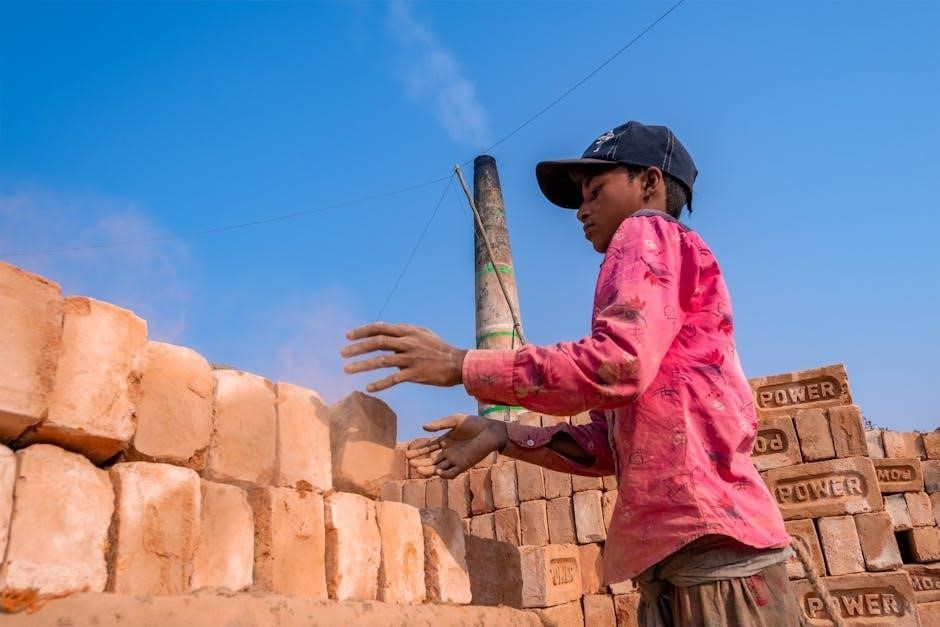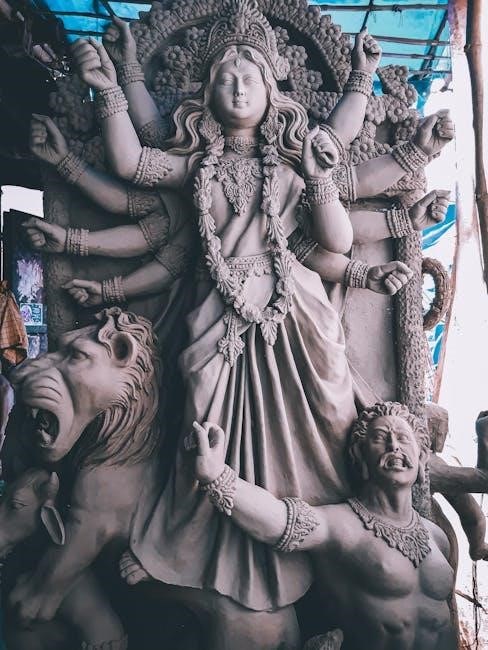
A General Power of Attorney (GPA) is a legal document enabling NRIs to appoint representatives in India to manage property, financial, and legal matters efficiently․
Overview of the Importance of Power of Attorney for NRIs
A General Power of Attorney (GPA) is indispensable for NRIs to manage their affairs in India seamlessly․ It allows them to appoint a trusted representative to handle property transactions, financial matters, and legal obligations without their physical presence․ This document is crucial for NRIs to avoid delays and legal complications in selling, purchasing, or managing assets in India․ It also empowers the attorney to operate bank accounts, sign agreements, and complete registration processes․ Without a GPA, NRIs may face difficulties in executing tasks remotely, making it a vital tool for ensuring their interests are protected․ It provides peace of mind and ensures compliance with Indian legal requirements․
Key Purposes of a General Power of Attorney in India
A General Power of Attorney (GPA) serves multiple critical purposes for NRIs in India․ It primarily enables the appointed attorney to manage and execute transactions related to property, such as buying, selling, and transferring ownership․ Additionally, it allows the attorney to handle financial matters, including operating bank accounts, withdrawing funds, and issuing cheques․ The GPA also covers legal responsibilities, such as registering documents, signing agreements, and representing the NRI in court proceedings․ Furthermore, it facilitates business transactions, including entering into contracts and managing investments․ Overall, the GPA provides a comprehensive mandate, ensuring that NRIs’ affairs in India are efficiently and legally managed without their physical presence, thus avoiding potential delays and complications․

Understanding the General Power of Attorney Document
A General Power of Attorney document empowers NRIs to appoint a trusted representative in India, outlining their authority to handle property, financial, and legal matters as specified․
Structure and Key Components of the Document
A General Power of Attorney document for NRIs in India typically includes the appointer’s details, the attorney’s details, and a clear outline of the scope of authority․ It begins with a preamble stating the purpose, followed by specific clauses authorizing the attorney to act on behalf of the NRI․ Key components include the appointer’s name, address, and occupation, as well as the attorney’s name and relationship․ The document also specifies the powers granted, such as managing property, handling financial transactions, or conducting legal proceedings․ It must be executed on non-judicial stamp paper of appropriate value and notarized, often requiring attestation by the Indian embassy or consulate․ The document’s validity and acceptance depend on these structural and legal requirements․
Differences Between General and Specific Power of Attorney
A General Power of Attorney (GPA) grants broad authority to the attorney to manage various affairs, including property, finances, and legal matters, offering flexibility for NRIs․ In contrast, a Specific Power of Attorney limits the attorney’s powers to a particular task, such as selling a property or managing a bank account․ While GPA is ideal for comprehensive management, Specific POA is suited for single or limited purposes․ The scope and duration of authority differ significantly, with GPA being more versatile but requiring careful drafting to prevent misuse․ Understanding these distinctions helps NRIs choose the appropriate document based on their specific needs and requirements in India․
Creating a General Power of Attorney for NRIs
NRIs can create a GPA by drafting the deed online or hiring an Indian lawyer․ The document must be executed on non-judicial stamp paper and attested․
Steps to Draft the Power of Attorney Deed
Drafting a Power of Attorney (POA) deed involves outlining the grantor’s details, specifying the attorney’s powers, and including witnesses’ signatures․ The deed must be executed on non-judicial stamp paper, with the value determined by the state’s regulations․ NRIs can draft the POA online using platforms like apps․am22tech․com or hire an Indian lawyer․ The POA must be notarized by the Indian Embassy or Consulate in the NRI’s country of residence․ The deed should clearly state the scope of authority, such as property transactions or financial management, ensuring it complies with Indian legal standards to avoid rejection․ Proper execution ensures the attorney can act legally on behalf of the NRI in India․
Documents Required for Executing the Power of Attorney
Executing a Power of Attorney (POA) for NRIs requires specific documents, including a valid passport, ID proofs, and a non-judicial stamp paper of appropriate value․ Photocopies of the passport, including the front, back, and visa pages, must be attached․ A recent passport-sized photograph is also mandatory․ The NRI must provide proof of Indian address and occupation․ Additionally, a notarized affidavit or declaration may be needed․ The POA deed should be witnessed by at least two individuals, who must provide their ID proofs․ For online execution, platforms like apps․am22tech․com offer templates and legal forms․ Proper documentation ensures the POA is legally valid and enforceable in India․

Legal Requirements and Formalities
The POA must be executed on non-judicial stamp paper, notarized, and attested by the Indian Embassy or Consulate․ The attorney must be a resident of India․
Stamp Paper and Notarization Process

The General Power of Attorney for NRIs must be executed on non-judicial stamp paper of appropriate value, as per the state’s regulations․ After drafting, the document is notarized by a Notary Public in India, ensuring its legal validity․ For NRIs executing the POA abroad, the document must be attested by the Indian Embassy or Consulate in their country of residence․ This involves signing the document in the presence of embassy officials and affixing the requisite stamps․ Proper notarization and attestation are critical to prevent legal challenges and ensure the attorney’s authority is recognized in India․ Failure to comply with these formalities may render the POA invalid․
Role of the Indian Embassy or Consulate in Attestation
The Indian Embassy or Consulate plays a pivotal role in authenticating the General Power of Attorney (GPA) for NRIs․ After drafting the GPA, NRIs must sign it in the presence of embassy officials, who verify their identity and witness the signature․ The embassy then attests the document by affixing an official seal and stamp, confirming its validity for use in India․ This process ensures the GPA meets legal requirements and is recognized by Indian authorities․ The attestation process varies slightly between countries but typically involves submitting the GPA, providing identification, and paying a nominal fee․ This step is essential for ensuring the document’s authenticity and enforceability in India․ Proper attestation prevents legal disputes and ensures smooth execution of the attorney’s duties․

Sample General Power of Attorney for NRIs
A sample GPA for NRIs is available online, outlining the grantor’s authority to manage property, finances, and legal matters in India, ensuring compliance with Indian laws and notarization requirements․
How to Obtain a Sample Template
Obtaining a sample General Power of Attorney (GPA) template for NRIs is straightforward․ Online platforms like DocHub, FormsPal, and legal websites offer downloadable templates․ These templates are tailored for NRIs and cover various scenarios, such as property management, financial transactions, and legal matters․ Additionally, consulting with a lawyer in India or visiting the Indian Embassy/Consulate can provide authentic templates․ Ensure the template adheres to Indian legal standards and includes essential clauses for notarization and attestation․ Always customize the template to suit specific needs and verify its compliance with local laws before execution․ This ensures the document is legally binding and avoids future complications․
Customizing the Sample to Suit Specific Needs
Customizing a General Power of Attorney (GPA) template for NRIs involves tailoring it to address specific requirements․ Start by identifying the scope of authority, such as property management, financial transactions, or legal matters․ Include detailed clauses for selling, purchasing, or transferring assets, and specify powers like signing deeds or operating bank accounts․ Mention the attorney’s details, such as their relationship to the NRI and Indian residency status․ Incorporate property descriptions if applicable․ Use placeholders for customizable sections to ensure clarity․ Legal consultation is recommended to ensure the document aligns with Indian laws and the NRI’s needs․ This step ensures the GPA is comprehensive, legally binding, and suitable for the intended purposes․
A General Power of Attorney is a vital tool for NRIs to manage Indian affairs remotely․ Customizing it ensures legality and alignment with specific needs, safeguarding interests effectively․
Final Tips for NRIs on Using a General Power of Attorney
For NRIs, drafting and attesting a General Power of Attorney (GPA) is crucial for managing Indian affairs․ Ensure the deed is executed on non-judicial stamp paper and attested by the Indian embassy or consulate․ Include detailed grantor and attorney information to avoid legal complications․ Select a trustworthy attorney and clearly outline their powers to prevent misuse․ Customizing the GPA to specific needs ensures its effectiveness․ Consulting a lawyer is recommended for complex cases․ Regularly review and update the GPA to reflect changing circumstances․ Properly notarizing and registering the document guarantees its validity in India, safeguarding NRIs’ interests and streamlining decision-making processes remotely․